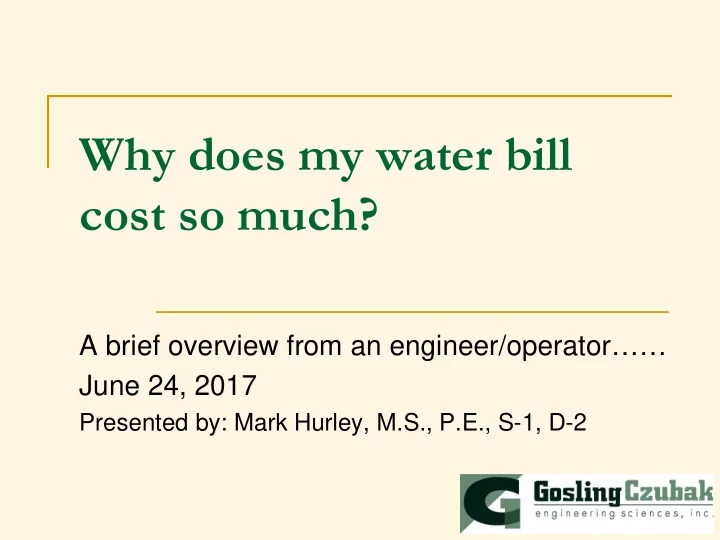

Why does my water bill cost so much? A brief overview from an engineer/operator…… June 24, 2017 Presented by: Mark Hurley, M.S., P.E., S-1, D-2
What is a water system? Water Production Surface Water Intakes – Low Lift Pumps I. Groundwater Wells II. Water Treatment (Surface or GWs) Sedimentation I. Filtration II. Clarification III. Chemical Precipitation/Oxidation/Disinfection IV.
What is a water system?
What is a water system? Water Distribution High Service Pumps I. Pipe (Transmission and Distribution) II. Disinfection III. Valves IV. Hydrants V. Elevated Water Tanks VI. Ground Storage Tanks VII. VIII. Water Booster Stations Chemical Feed Pumps IX. Metering X.
Water Distribution continued Water Distribution Pipe Pipe (Transmission and Distribution) I. Cast Iron • Asbestos-Cement • Ductile Iron • Polyvinyl Chloride (PVC) • High Density Polyethylene (HDPE) •
Water Distribution continued Water Distribution Valves Isolation Valves I. Gate Valves • Butterfly Valves • Plug Valves • Ball Valves • Butterfly Valve Gate Valve Ball Valve Plug Valve
Water Distribution continued Water Distribution Hydrants Fire protection I. Flushing II.
Water Distribution continued Water Towers Types I. Waterspheroid • Steel Hydropillar • Composite • Standpipes • Fire Protection II. System Pressure III.
Water Distribution continued Water Booster Stations Fire Protection I. System Pressure II. Fill Elevated Tank III.
Water Distribution continued Chemical Feed Pumps/Systems Disinfection I. Corrosion Inhibition II. Iron Control III. Fluoride Addition IV.
Water Distribution continued Metering Production I. Irrigation II. Commercial III. Industrial IV. Residential V. Community VI.
Why was all that so important? The Federal Safe Drinking Water Act (SDWA) of 1974 was set forth to protect drinking water and its sources. The State of Michigan also passed a similar rule to help the Department of Environmental Quality protect drinking water (PA 399). Both engineers and operators must be educated and have experience to design, construct, operate and maintain a water system (this includes knowing the Rule).
Engineering Importance Understanding the needs (rather than the desires) of the system based on the following items: System operational knowledge Production vs Usage I. Increased/Decreased Usage trending II. Increased/Decreased treatments needs III. Hydraulic requirements (demands; pressures) IV. Fire flow requirements (ind./comm./res.) V.
Engineering Importance Understanding that any alteration or improvement to the water system must have plans and specifications submitted to the DEQ that are stamped by a registered P.E. of the State of Michigan. No construction improvements can occur until the department issues an Act 399 permit. The plans and specifications shall be prepared in accordance with the Great Lakes Upper Mississippi board of state sanitary engineers (a.k.a. – Ten States Standards) Get funding to construct the aforementioned projects (i.e.- higher rates, SRF, RD, grants, bonds)
Operation and Maintenance Importance Understanding the system and how it operates under many different sets of conditions System operational knowledge Similar set of requirements to what was noted above I. but the operator is required to know the day-to-day operations above and beyond the big picture. The following are some typical O&M duties that are necessary in a water works operation: Daily flow production • Daily sampling (chlorine residual in distribution) • Other sampling to meet Act 399 requirement • (Lead/Copper, VOCs, SOCs, TTHMs, etc.)
Operation and Maintenance Importance Chemical feed adjustments • Meter reading • Cross-connection control • Hydrant flushing • Hydrant painting • Unidirectional flushing • Parts Inventory • Valve turning • Complaints • Water main breaks • Telemetry failures •
Operation and Maintenance Importance
Operation and Maintenance Importance Well maintenance • Pump maintenance/replacement (any type) • MORs • Annual report development • MORs • Record keeping • Dealing with engineers to develop Act 399 General • Plans and emergency response plans Develop and Asset Management Plan • Train other operators so adequate licenses can be • obtained
Operation and Maintenance Importance Complete continuing education training to maintain • license Take additional licensing exams as required by Act 399 • Coordinate with DEQ as little as possible (as long as the • system is working well)
Why is this so important? If the team of operators, engineers, regulators and DEQ • are all working together to operate and maintain an efficient water works, the drinking water generally tastes good, the public stays safe and the water rates typically reasonable.
Questions? Thank you
Recommend
More recommend